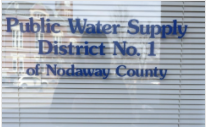 The Public Water Supply District of Nodaway County (Rural Water) was notified in December, as the 25-year contract dictates, of the City of Maryville’s increased water rates which take effect February 1.
The Public Water Supply District of Nodaway County (Rural Water) was notified in December, as the 25-year contract dictates, of the City of Maryville’s increased water rates which take effect February 1.
The 60-day notice gave a 10 percent increase for 2022 and 10 percent for 2023 which are significant increases. Rural Water, while in sound financial standing, will not be able to absorb this extra expense; however, the leadership has not decided a definite path.
Presently, 90 percent of the water that Rural Water buys comes from the City of Maryville. They are contracted to purchase 120 million gallons a year. In 2021, Rural Water purchased 190 million gallons from Maryville as well as purchased water from Southwest Iowa Regional Water. The district also purchased a water treatment plant in Gentry. These two entities supply water to the Clearmont and Parnell areas. Rural Water also supplies water to 2,740 rural meters and in the towns of Barnard, Guilford, Pickering, Sheridan, Clyde, Conception and Arkoe. There are also connections with Hopkins, Conception Jct., Ravenwood, Parnell, Grant City, Stanberry, Graham and Burlington Jct., which would allow for redundancy if needed.
Rural Water has expanded its water service territory to cover all of Nodaway County to any rural resident if the person desired to be connected. This expansion also included several of the county’s small towns that had aging water treatment plants. The cost of the needed infrastructure of lines and meters have the Rural Water district in debt, so the added cost of the water production will need to be passed along to customers at some point.
The 500,000 gallons per day water purchase from Maryville makes Rural Water the largest customer of the city. Each time Maryville raises the water rate, Rural Water receives an increase also with four increases since 2009. Rural Water has absorbed some of the past increases. The latest increase plan will amount to over $250,000 per year.
This increase should be noted as purely an increase in the treatment cost to make the water and is not connected to a proposed new water plant to be possibly built within the next decade. Rural Water is presently in negotiations with Maryville about participation in the construction and operations of a new plant. To further study the possibility, Rural Water has agreed to partner with the city to build and operate a pilot water treatment plant.
Rural Water funded $600,000 to Maryville toward the cost of the GAC adsorber, which through a series of charcoal filters, eliminated the water smell and taste issues. The GAC adsorber went online in December.
Both the costs associated with the pilot water treatment plant and the GAC adsorber that Rural Water has spent would be paid back by the city if a new joint water treatment plant is not ultimately pursued.
“This rate increase is a serious matter for all rural customers,” said Norman Wilson, Rural Water board president. “We strive to provide the best water at the cheapest price.”




Facebook Comments